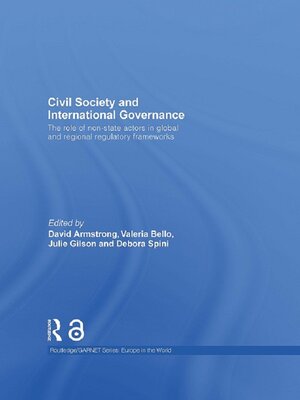Civil Society and International Governance
ebook ∣ The role of non-state actors in global and regional regulatory frameworks · Routledge/GARNET series
By David Armstrong

Sign up to save your library
With an OverDrive account, you can save your favorite libraries for at-a-glance information about availability. Find out more about OverDrive accounts.
Find this title in Libby, the library reading app by OverDrive.



Search for a digital library with this title
Title found at these libraries:
| Loading... |
A PDF version of this book is available for free in open access via www.tandfebooks.com as well as the OAPEN Library platform, www.oapen.org. It has been made available under a Creative Commons Attribution-Non Commercial-No Derivatives 3.0 license and is part of the OAPEN-UK research project.
Structures and processes occurring within and between states are no longer the only – or even the most important - determinants of those political, economic and social developments and dynamics that shape the modern world. Many issues, including the environment, health, crime, drugs, migration and terrorism, can no longer be contained within national boundaries. As a result, it is not always possible to identify the loci for authority and legitimacy, and the role of governments has been called into question.
Civil Society anf International Governance critically analyses the increasing impact of nongovernmental organisations and civil society on global and regional governance. Written from the standpoint of advocates of civil society and addressing the role of civil society in relation to the UN, the IMF, the G8 and the WTO, this volume assess the role of various non-state actors from three perspectives: theoretical aspects, civil society interaction with the European Union and civil society and regional governance outside Europe, specifically Africa, East Asia and the Middle East. It demonstrates that civil society's role has been more complex than one defined in terms, essentially, of resistance and includes actual participation in governance as well as multi-facetted contributions to legitimising and democratising global and regional governance.
This book will be of interest to students and scholars of political science, international relations, civil society, sociology, European politics and global governance.






